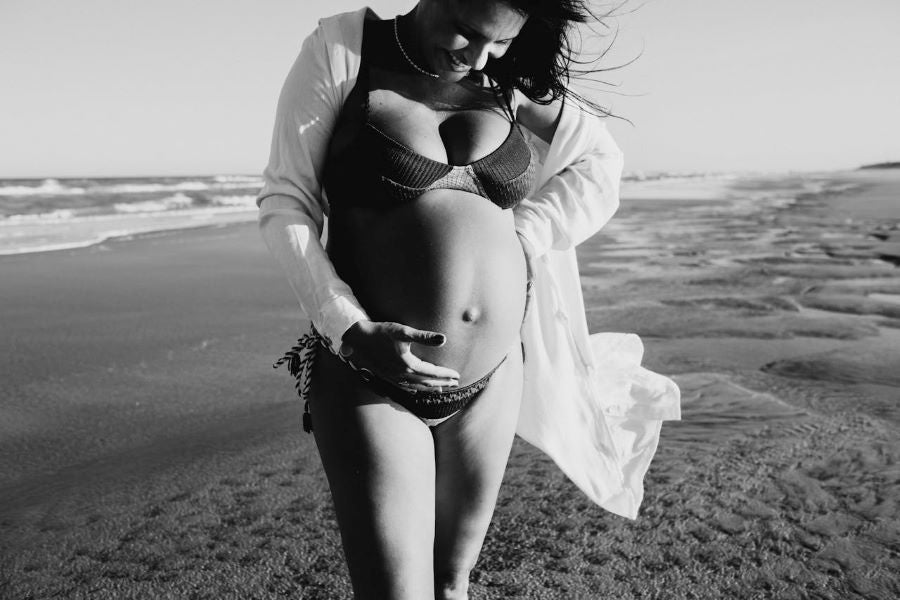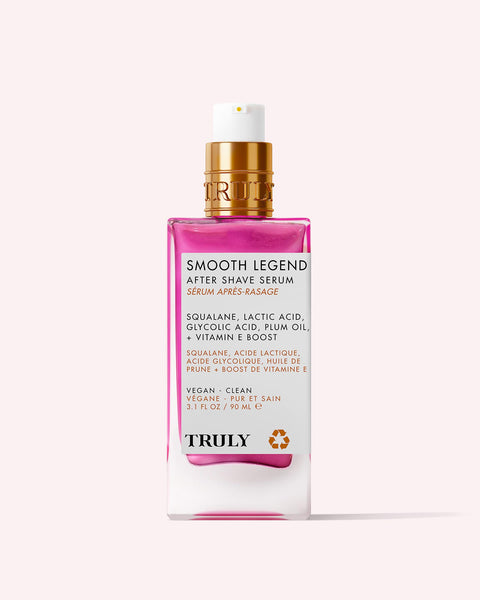How to Choose the Best Sunscreen for Pregnancy

Finding the best sunscreen for pregnancy can be challenging. Especially when you’re looking for products that are effective, gentle, and safe for both you and your baby. Using pregnancy safe sunscreen can protect against UV rays, prevent melasma, and keep your skin healthy. That’s why it’s an essential part of your skincare routine.
Ahead, we’re going to give you advice on how to choose the best pregnancy-safe sunscreen. From what ingredients to avoid to tips on how to keep your skin protected, here’s everything you should know.
Why You Need Pregnancy-Safe Sunscreen
Pregnancy brings hormonal changes that can make your skin more sensitive. It can also leave you prone to melasma where dark spots or hyperpigmentation develop on the skin, particularly on the face.
The best way to protect against sun-induced pigmentation is by using a pregnancy-safe, broad-spectrum sunscreen every day. Broad-spectrum sunscreens protect against both UVA and UVB rays, reducing the risks of sunburn, skin aging, and skin cancer.
How to Choose the Best Sunscreen for Pregnancy
Choosing the best sunscreen for pregnancy means paying attention to its active ingredients and formulation to ensure it’s safe for pregnant women. Here are some tips for choosing the right sunscreen during pregnancy.
-
Opt for Mineral-Based Sunscreens
Dermatologists recommend mineral sunscreens (AKA, physical sunscreens) over chemical sunscreens during pregnancy. Mineral sunscreens contain zinc oxide and titanium dioxide. These key ingredients are generally safe, as they sit on top of the skin to block UV rays rather than absorbing into the skin.
In addition to containing safe ingredients, mineral sunscreens tend to be gentler on sensitive skin, making them ideal for women experiencing increased skin sensitivity during pregnancy.
-
Look for Broad Spectrum SPF 30 or Higher
According to dermatologists, you should choose a broad-spectrum SPF of at least 30 for effective UVB protection. If you have fair or sensitive skin, or if you’re out in direct sun for extended periods, consider SPF 50. Broad-spectrum formulas ensure full coverage from both UVA rays, which cause aging and pigmentation, and UVB rays, which are responsible for sunburn.
-
Make Sure They’re Fragrance-Free and Unscented
To avoid nausea from strong smells and reduce the chance of skin irritation, go for fragrance-free or unscented sunscreen options. Many pregnancy-safe sunscreens come without fragrance and are also oil-free, which can help prevent breakouts for those with acne-prone or sensitive skin.
-
Choose a Formula With Hydrating Ingredients
Ingredients like hyaluronic acid, shea butter, aloe, and vitamin E can be beneficial in sunscreens, offering additional hydration and soothing properties for dry or sensitive skin types. A hydrating, mineral-based sunscreen with SPF 40 or SPF 50 is a great choice for pregnant women with dry skin, as it provides sun protection while keeping the skin nourished.
Ingredients to Avoid in Sunscreen During Pregnancy
When it comes to selecting the best sunscreen for pregnancy, you want to avoid products that contain harmful ingredients. Here are the ingredients to watch out for (and avoid).
Oxybenzone and Octinoxate
Oxybenzone and octinoxate are common chemical sunscreen ingredients that are best avoided during pregnancy, as studies suggest they may disrupt hormones. Instead, opt for mineral sunscreens, which don’t penetrate the skin and are deemed safe by dermatologists.
Retinyl Palmitate (Vitamin A Derivative)
Retinyl palmitate and other vitamin A derivatives can increase the risk of birth defects. For that reason, dermatologists recommend avoiding it in sunscreen or in any other product. Look for products labeled as “retinoid-free” or “free of vitamin A” for added peace of mind.
Alternatively, check the full ingredients list to ensure it’s not in there. You can get most of the same benefits as retinol with pregnancy-safe bakuchiol.
Parabens
Parabens are preservatives that may interfere with hormone function, so it’s best to look for paraben-free sunblock options.
Chemical Sunscreens with Avobenzone, Octocrylene, and Homosalate
These ingredients are common in chemical sunscreens but are less studied for safety during pregnancy. Choosing physical sunscreens or mineral sunscreen SPF 30 or higher is usually a safer route for pregnant women.
How to Choose Pregnancy-Safe Sunscreen for Your Skin Type
When choosing the best sunscreen for pregnancy, consider your skin type to find a formulation that works best for you.
If you’ve got sensitive skin, choose a mineral-based, fragrance-free sunscreen. Those with dry skin, however, should opt for a moisturizing sunscreen with hydrating ingredients like hyaluronic acid, aloe, or vitamin E which will add moisture to your skin.
Got acne-prone skin? Select an oil-free, non-comedogenic formula which will help prevent breakouts. Mineral sunscreens are often the best choice for acne-prone skin as they don’t clog your pores.
Many mineral sunscreens can leave a “white cast” on the skin, especially on darker skin tones. Look for tinted sunscreen options or a face sunscreen with added tint to help blend better with your natural skin tone.
How to Get Maximum Protection From Pregnancy Safe Sunscreen
You can have the best sunscreen for pregnancy but if you’re not applying it correctly, you won’t get adequate protection. Here are some tips for applying it correctly.
Use Enough Product
Apply about a nickel-sized amount for the face and a shot glass amount of for the body to ensure full protection. A tinted moisturizer with SPF can be a great addition for your face, but it won’t replace full sunscreen coverage.
Reapply Every Two Hours
Even with high SPF, sunscreen wears off over time, especially in water or when you sweat. Opt for a water-resistant sunscreen lotion and reapply every two hours, or after swimming or sweating, to keep your skin protected.
Layer with Other Safe Skincare Products
A pregnancy safe skincare routine that includes antioxidants like niacinamide and vitamin C can further protect your skin by helping to combat free radicals. Applying a sunscreen stick to sensitive areas, such as the nose or cheeks, can also provide targeted protection.
Use Additional Sun Protection
Alongside regular and consistent sunscreen application, enhance your protection by wearing a wide-brimmed hat, sunglasses, and protective clothing. Always try to avoid direct sun exposure to keep your skin healthy and happy.
Choosing the best sunscreen for pregnancy is an essential step in maintaining healthy, glowing skin while protecting yourself and your baby. With so many dermatologist-recommended and Amazon-approved options available, finding the best pregnancy safe sunscreen lotion or tinted moisturizer is easier than ever.
Feature photo by Jonathan Borba













